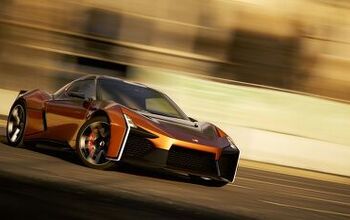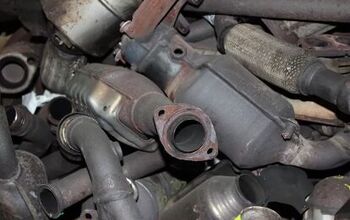Germany Tells Owners of Cheating Volkswagen Diesels to Get Their Cars Neutered or Hand Over the Registration

Germany’s federal motor transport authority, die Kraftfahrt-Bundesamt (KBA), told dieselgate holdouts that haven’t yet fixed their emissions-cheating cars to get them repaired or prepare to have their registration revoked. In fact, officials in Hamburg and Munich have already taken several Audi and VW vehicles off the road.
It’s no wonder there’s cold feet among the citizenry. Reports out of Germany last year revealed that engines returned from the fixes behaving like a person suffering from an incredibly traumatic experience. They just weren’t the same anymore. Some units saw up to a 10-percent decrease in performance and likely ended up with a less-beefy torque curve biased toward higher engine speeds. Fearing that the Volkswagen Group’s “emissions repair” could effectively neuter their car, those abstaining from the recall are now left with no recourse.
According to Automotive News and its German counterpart, Automobilwoche, the automaker gave VW customers a final ultimatum after repeated warnings.
“The recall [for affected VW diesel cars] is compulsory. Cars that are not fixed can eventually be taken out of service. Subject to the release date of the updates, the car owner has had about a year and a half. Plenty of time, to take part in the recall,” the KBA explained.
You’re probably thinking it’s no big deal and German citizens worried about their car can just get the buyback cash and purchase something else. Sadly, it’s not that simple. While the United States slapped Volkswagen with massive fines and forced it to compensate its customers in full, Europe did not. All the manufacturer has to do is fix the engines to bring them into compliance with emissions standards via (the removal of the contentious “defeat device”).
That basically amounts to customers having to hand over their fully functional automobile, only to get it back with less pep. The KBA claims roughly 95 percent of the 2.46 million affected vehicles in Germany underwent the fix since June of this year. Some 0.6 percent of the remaining cars earned a date with registering authorities following repeated warnings, lighting the fuse on their being taken off the road for noncompliance.
The KBA issued its final warnings at the start of summer, with most drivers heeding them. But reports of fixed European-spec VWs developing new issues persist. In the case of some 1.6-liter diesels, researchers claim the automaker reduced NOx emissions by upping CO2 emissions and lowering fuel economy. The result? More complaints of vehicles exhibiting rough idle and reduced power.

A staunch consumer advocate tracking industry trends and regulation. Before joining TTAC, Matt spent a decade working for marketing and research firms based in NYC. Clients included several of the world’s largest automakers, global tire brands, and aftermarket part suppliers. Dissatisfied with the corporate world and resentful of having to wear suits everyday, he pivoted to writing about cars. Since then, that man has become an ardent supporter of the right-to-repair movement, been interviewed on the auto industry by national radio broadcasts, driven more rental cars than anyone ever should, participated in amateur rallying events, and received the requisite minimum training as sanctioned by the SCCA. Handy with a wrench, Matt grew up surrounded by Detroit auto workers and managed to get a pizza delivery job before he was legally eligible. He later found himself driving box trucks through Manhattan, guaranteeing future sympathy for actual truckers. He continues to conduct research pertaining to the automotive sector as an independent contractor and has since moved back to his native Michigan, closer to where the cars are born. A contrarian, Matt claims to prefer understeer — stating that front and all-wheel drive vehicles cater best to his driving style.
More by Matt Posky
Latest Car Reviews
Read moreLatest Product Reviews
Read moreRecent Comments
- Wjtinfwb My comment about "missing the mark" was directed at, of the mentioned cars, none created huge demand or excitement once they were introduced. All three had some cool aspects; Thunderbird was pretty good exterior, let down by the Lincoln LS dash and the fairly weak 3.9L V8 at launch. The Prowler was super cool and unique, only the little nerf bumpers spoiled the exterior and of course the V6 was a huge letdown. SSR had the beans, but in my opinion was spoiled by the tonneau cover over the bed. Remove the cover, finish the bed with some teak or walnut and I think it could have been more appealing. All three were targeting a very small market (expensive 2-seaters without a prestige badge) which probably contributed. The PT Cruiser succeeded in this space by being both more practical and cheap. Of the three, I'd still like to have a Thunderbird in my garage in a classic color like the silver/green metallic offered in the later years.
- D Screw Tesla. There are millions of affordable EVs already in use and widely available. Commonly seen in Peachtree City, GA, and The Villages, FL, they are cheap, convenient, and fun. We just need more municipalities to accept them. If they'll allow AVs on the road, why not golf cars?
- ChristianWimmer Best-looking current BMW in my opinion.
- Analoggrotto Looks like a cheap Hyundai.
- Honda1 It really does not matter. The way bidenomics is going nobody will be able to afford shyt.


































Comments
Join the conversation
Hello Matt Posky, Great informative post, after reading this post, some of the confusion is clear from my mind.
Clever pun on German grammar is embedded in the title.